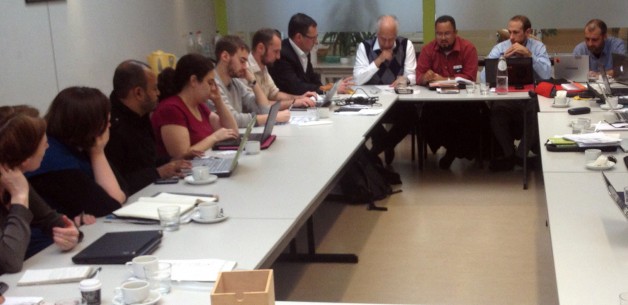This post is also available in: Spanish
The Bank Information Center (BIC) organized a series of advocacy meetings in Europe from March 10-18 around key priorities in the World Bank’s safeguards review, coordinating visits by a small delegation of civil society representatives that included Yoni Rivas from Honduras, Gonzalo Roza from Argentina, and Samuel Nnah from Cameroon.
The civil society delegation attended a meeting of the Euro IFI CSO coalition on March 12-13 in Brussels, Belgium, which focused on engagement and strategy around the World Bank’s safeguard review. The group met with the European Executive Directors of the World Bank on March 13, including Ingrid Hoven from Germany, Piero Cipollone from Italy, and Frank Heemskerk from the Netherlands.
BIC and partners also traveled to nearby European capitals—including London, Paris, and The Hague—to engage ministry officials and members of parliament on timely issues around the safeguards review. Key issues relating to the revised safeguards framework include covering all Bank lending instruments in a comprehensive way, maintaining the core responsibilities and accountability for safeguard outcomes within the Bank itself, and aligning Bank safeguards with the highest international standards on emerging issues.
Yoni Rivas, a leader of Aguan’s Unified Peasant Movement (Movimiento Unificado Campesino del Aguán, MUCA) in Honduras, discussed the land grabbing, murders, and human rights violations linked to the Corporación Dinant, a palm oil corporation in Honduras that received a loan from the International Finance Corporation in 2009. Yoni argued that the human violations by Dinant’s security forces against campesinos in Bajo Aguán demonstrate the IFC’s lack of compliance with its standards, and highlight the risks of World Bank adopting IFC’s flexible approach to environmental and social safeguard policies.
Samuel Nnah, who works with grassroots groups in the Congo Basin, emphasized the need for a safeguard policy on climate change, highlighting the lack of climate changes consideration in the World Bank-financed Lom Pangar dam in Cameroon. He also discussed the lack of consultation and consideration of indigenous peoples’ rights in a development policy loan (DPL) by the World Bank to the Democratic Republic of Congo that involved timber concession reform. As a DPL, the project was not covered by the Bank’s environmental and social safeguards, but the harm it caused to indigenous communities demonstrated the necessity of all Bank lending instruments being covered by safeguards.
Gonzalo Roza, coordinator of the Global Governance Program at FUNDEPS (Fundación para el Desarrollo de Políticas Sustentables) in Argentina, discussed trends in development finance in Latin America and the impact of civil society advocacy. With the growth of investments by new development banks like BNDES and China Development Bank, the World Bank is losing influence in the region. To avoid a scenario in which the Bank weakens its safeguard policies in an attempt to become more competitive, Gonzalo stressed that civil society organizations must continue to push for strong safeguards.

